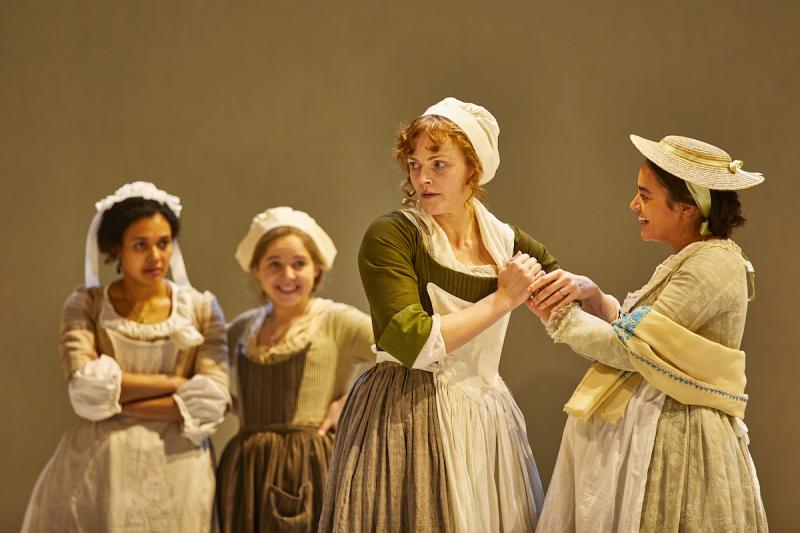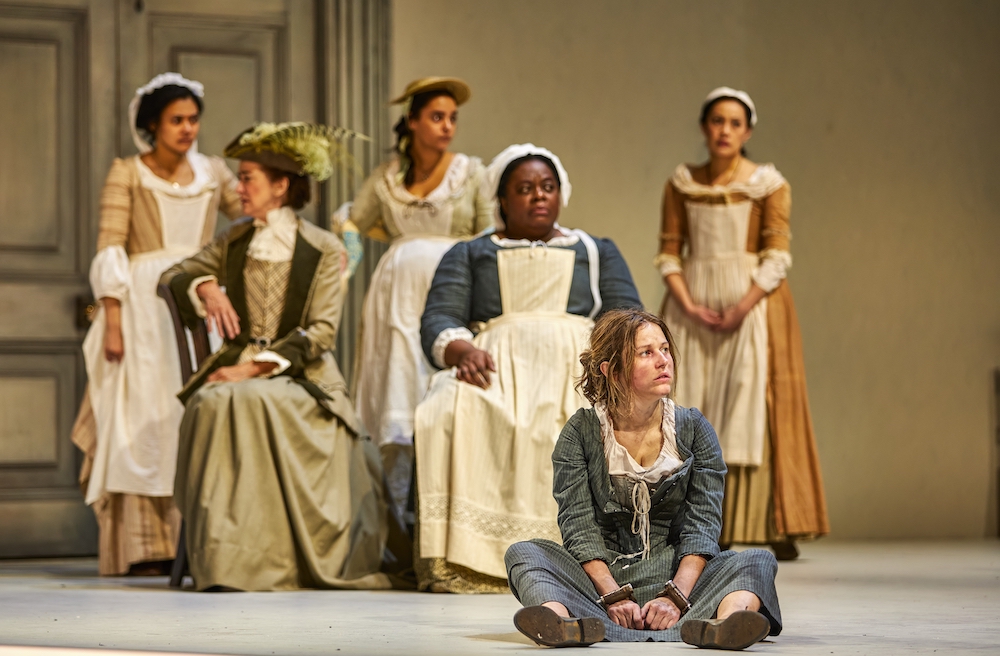The Welkin, National Theatre review - women's labour is a pain | reviews, news & interviews
The Welkin, National Theatre review - women's labour is a pain
The Welkin, National Theatre review - women's labour is a pain
Maxine Peake struggles to make the voice of reason heard in feminist history play

History plays should perform a delicate balancing act: they have to tell us something worth knowing about the past, that foreign country where they do things differently, and also something about our current preoccupations. Otherwise, what's the point?
Set in March 1759, somewhere on the border of Norfolk and Suffolk, The Welkin tells the story of Sally Poppy, a young woman who is arrested for a particularly brutal child murder. She did not, however, act alone. Her male lover, who was also involved in the killing, is immediately tried and hanged, but although she is likewise condemned to death she "pleads her belly", meaning that she claims to be pregnant. In the 18th century, while the law had no qualms about executing women, the idea of killing an innocent unborn child was sufficiently disturbing to allow for the woman to have her sentence commuted to transportation to the north American colonies.
But how does the law know if a woman is pregnant or not? In this case, a jury of 12 women is empaneled and instructed to investigate. Mrs Charlotte Cary, widow of an army colonel, is empowered, because of her class, to be the "fore-matron" and conduct proceedings. As in the case of Reginald Rose's 1954 story, Twelve Angry Men, the jury represents a variety of characters, social types and points of view. The most significant woman is Elizabeth Luke (Peake) the local midwife, who remembers bringing Sally into the world and is determined not to let her be hanged. But she has a struggle on her hands.
 This is because Sally is an angry woman. No, a very angry woman. Not only is she a criminal, but she is also unhappily married and dreams of running away with a fantasy, Satan-like man, a person who will indeed lead her into temptation. She is also uncooperative and makes no effort to be liked by the other 11 women. Yet Elizabeth perseveres and tries to convince the more sceptical or hostile women that Sally is pregnant. As the women swap experiences of childbirth, waver in their opinions, change sides, get swayed by reason or express their hatred of the outsider, various details of their past lives emerge, and skeletons come flying out of the cupboard with all the grim speed of a body falling down a trapdoor. Towards the end the jokes fall away and the material becomes increasingly harrowing, rising to a rare pitch of cruelty.
This is because Sally is an angry woman. No, a very angry woman. Not only is she a criminal, but she is also unhappily married and dreams of running away with a fantasy, Satan-like man, a person who will indeed lead her into temptation. She is also uncooperative and makes no effort to be liked by the other 11 women. Yet Elizabeth perseveres and tries to convince the more sceptical or hostile women that Sally is pregnant. As the women swap experiences of childbirth, waver in their opinions, change sides, get swayed by reason or express their hatred of the outsider, various details of their past lives emerge, and skeletons come flying out of the cupboard with all the grim speed of a body falling down a trapdoor. Towards the end the jokes fall away and the material becomes increasingly harrowing, rising to a rare pitch of cruelty.
By the end of this three-hour marathon there are enough twists to make a hangman's rope; at the same time, Kirkwood paints a vivid picture of women's experience as this jury talks and debates Sally's fate. Not only is there plenty of material about childbearing that applies both to contemporary women and to the women of the past, there is also a wealth of detail about the symptoms of pregnancy, as well as descriptions of religious ideas, superstitious beliefs and the poverty of everyday life some 300 hundred years ago. Bodily fluids are candidly discussed, as you would expect, but there are also surprises. At one point, a feverish woman is bled and recovers. The arrival of Halley's comet is alluded to, an angel is glimpsed and witches murmer on the sidelines, and there are mentions of colonial expansion, wars with France, the enclosure movement and the condition of female servants.
For us today, the discussion of the female body as a contested site seems immediately relevant, as is the representation of women's testimony and popular delusions and fantasies. A suspicion of the blood-lust of an unruly crowd feels very now. More provocatively, a women's right not to keep her child is a central plot point and the male gaze is part of the storytelling. The victimisation of women comes across strongly, and the arrival of a male doctor is seen as carrying more authority than the voices of ordinary women. Yet it is also true that men are told they must listen. In the dialogues, Kirkwood mixes historical phrases – such as "Here we be" – with more contemporary formulations, such as "I'll kick your cock into your kidneys." The title of the play is an olde word for sky or firmament.
James Macdonald's production begins with a breath-taking tableau which shows women at work, then plunges us into a hellishly crepuscular candle-lit scene before finally confining us in a wide large room, decorated by designer Bunnie Christie in tasteful greys. He manages the dramatic highpoints – such Sally's production of milk, followed by an explosive plot twist – with finesse, but he really does not serve Kirkwood's text very well. All the actors speak in a bewildering range of variable accents, with neither consistency nor clarity. Many passages are completely inaudible; a lot of detail simply gets lost in the demented naturalism of the show. It's a real strain to watch. Could we have some surtitles please?
This is a pity because, due to this fuzziness, it's hard to be sure exactly what the play is saying. Although Peake's Elizabeth starts off as the voice of reason, and has this actor's trademark, and likeable, down-to-earth sense, the plot is an accumulation of incidents that seem, with only the occasional exception, to prove that women have always been victims, and the final ghastly tragedy feels like it's completely drained of both hope and mercy. It's a really tough ask, this play. Ria Zmitrowicz (pictured in the foreground above) does her best to give Sally the necessary aggression and passion but, like the other women, her voice is not often clearly heard. Of the rest of the large cast, I was particularly impressed by Cecilia Noble as the bigoted but dignified Emma, Haydn Gwynne as a commanding Charlotte Cary, Brigid Zengeni as the mute Sarah Hollis, Wendy Kweh as the childless Helen and Dawn Sievewright as Scottish Kitty Givens. I really wanted to love this show, but the muddy production makes that very hard labour.
rating
Explore topics
Share this article
Add comment
The future of Arts Journalism
You can stop theartsdesk.com closing!
We urgently need financing to survive. Our fundraising drive has thus far raised £49,000 but we need to reach £100,000 or we will be forced to close. Please contribute here: https://gofund.me/c3f6033d
And if you can forward this information to anyone who might assist, we’d be grateful.

Subscribe to theartsdesk.com
Thank you for continuing to read our work on theartsdesk.com. For unlimited access to every article in its entirety, including our archive of more than 15,000 pieces, we're asking for £5 per month or £40 per year. We feel it's a very good deal, and hope you do too.
To take a subscription now simply click here.
And if you're looking for that extra gift for a friend or family member, why not treat them to a theartsdesk.com gift subscription?
more Theatre
 Cow | Deer, Royal Court review - paradox-rich account of non-human life
Experimental work about nature led by Katie Mitchell is both extraordinary and banal
Cow | Deer, Royal Court review - paradox-rich account of non-human life
Experimental work about nature led by Katie Mitchell is both extraordinary and banal
 Deaf Republic, Royal Court review - beautiful images, shame about the words
Staging of Ukrainian-American Ilya Kaminsky’s anti-war poems is too meta-theatrical
Deaf Republic, Royal Court review - beautiful images, shame about the words
Staging of Ukrainian-American Ilya Kaminsky’s anti-war poems is too meta-theatrical
 Laura Benanti: Nobody Cares, Underbelly Boulevard Soho review - Tony winner makes charming, cheeky London debut
Broadway's acclaimed Cinderella, Louise, and Amalia reaches Soho for a welcome one-night stand
Laura Benanti: Nobody Cares, Underbelly Boulevard Soho review - Tony winner makes charming, cheeky London debut
Broadway's acclaimed Cinderella, Louise, and Amalia reaches Soho for a welcome one-night stand
 The Pitchfork Disney, King's Head Theatre review - blazing with dark energy
Thrilling revival of Philip Ridley’s cult classic confirms its legendary status
The Pitchfork Disney, King's Head Theatre review - blazing with dark energy
Thrilling revival of Philip Ridley’s cult classic confirms its legendary status
 Born with Teeth, Wyndham's Theatre review - electric sparring match between Shakespeare and Marlowe
Rival Elizabethan playwrights in an up-to-the-minute encounter
Born with Teeth, Wyndham's Theatre review - electric sparring match between Shakespeare and Marlowe
Rival Elizabethan playwrights in an up-to-the-minute encounter
 Interview, Riverside Studios review - old media vs new in sparky scrap between generations
Robert Sean Leonard and Paten Hughes make worthy sparring partners
Interview, Riverside Studios review - old media vs new in sparky scrap between generations
Robert Sean Leonard and Paten Hughes make worthy sparring partners
 Fat Ham, RSC, Stratford review - it's Hamlet Jim, but not as we know it
An entertaining, positive and contemporary blast!
Fat Ham, RSC, Stratford review - it's Hamlet Jim, but not as we know it
An entertaining, positive and contemporary blast!
 Juniper Blood, Donmar Warehouse review - where ideas and ideals rule the roost
Mike Bartlett’s new state-of-the-agricultural-nation play is beautifully performed
Juniper Blood, Donmar Warehouse review - where ideas and ideals rule the roost
Mike Bartlett’s new state-of-the-agricultural-nation play is beautifully performed
 The Gathered Leaves, Park Theatre review - dated script lifted by nuanced characterisation
The actors skilfully evoke the claustrophobia of family members trying to fake togetherness
The Gathered Leaves, Park Theatre review - dated script lifted by nuanced characterisation
The actors skilfully evoke the claustrophobia of family members trying to fake togetherness
 As You Like It: A Radical Retelling, Edinburgh International Festival 2025 review - breathtakingly audacious, deeply shocking
A cunning ruse leaves audiences facing their own privilege and complicity in Cliff Cardinal's bold theatrical creation
As You Like It: A Radical Retelling, Edinburgh International Festival 2025 review - breathtakingly audacious, deeply shocking
A cunning ruse leaves audiences facing their own privilege and complicity in Cliff Cardinal's bold theatrical creation
 Edinburgh Fringe 2025 reviews: Refuse / Terry's / Sugar
A Ukrainian bin man, an unseen used car dealer and every daddy's dream twink in three contrasting Fringe shows
Edinburgh Fringe 2025 reviews: Refuse / Terry's / Sugar
A Ukrainian bin man, an unseen used car dealer and every daddy's dream twink in three contrasting Fringe shows
 Faustus in Africa!, Edinburgh International Festival 2025 review - deeply flawed
Bringing the Faust legend to comment on colonialism produces bewildering results
Faustus in Africa!, Edinburgh International Festival 2025 review - deeply flawed
Bringing the Faust legend to comment on colonialism produces bewildering results

Comments
Sitting in Row R in the